NewsBrief, 24 February – 2 March 2015
- Food security: RPCA reports generally stable conditions
- ECOWAS states vow to eradicate statelessness
- Mali parties reach agreement on draft peace deal
- Nigerian president tours areas recaptured from Boko Haram
- Who's Who? General Bouréma Condé, Guinean Minister of the Interior
- Publication: Combined mid-term review and regional portfolio performance review of the regional integration strategy paper for West Africa 2011 - 2015
Food Security: RPCA reports generally stable conditions
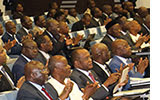 Meeting from 2-4 March, members of the Food Crisis Prevention Network (RPCA) find that the overall situation in the region is stable, though there are pockets of food and nutrition insecurity in some areas, particularly because of civil insecurity and a decline in the purchasing power of vulnerable households, particularly in areas affected by the Ebola epidemic. On that topic, Harmonised Framework analysis conducted in February 2015 in the Guinea, Liberia and Sierra Leone reveals that by June-August, about 2.2 million people could be in a situation of food and nutrition emergency if appropriate mitigation measures are not implemented. A deeper analysis of the food and nutrition situation in the region will be conducted during the next meeting of the system for the prevention of food crises (PREGEC) in April. The Network calls particular attention to the existence of negative signs that could affect people's food security and resilience of in the medium and long-term. These include: i) the reluctance of farmers to return to their abandoned fields in the affected areas, as well as the loss of their production means; ii) the time required for rebuilding livelihoods; iii) difficulties in implementing assistance programmes due to people's lack of confidence in the use of health and educational centres. Similarly, the movement restrictions associated with the general psychosis have made it difficult to collect data, ensure quality control and, above all, prepare rapid analysis for decision- making. This situation calls on the Network to invest more in the elaboration of innovative tools to develop capacity to deal with similar crises while capitalising on existing best practices. In their summary of conclusions, the Network's members offer a series of recommendations in this direction. Several projects pursued within the framework of the Network were put to debate, including the Regional Food Security Reserve, the first external evaluation of the Charter for food crisis prevention and management and the inclusive dialogue process around the Global Alliance for Resilience (AGIR) - Sahel and West Africa. At the invitation of the regional organisations, a high-level conference on funding the implementation of resilience priorities (2016-20) is expected in October or November. The 31st RPCA annual meeting will be held from 14 to 18 December in Madrid. This will be preceded by a meeting dedicated to advocacy and lobbying for the Network, which will be held within the Universal Exposition from 27 to 31 October in Milan.
Meeting from 2-4 March, members of the Food Crisis Prevention Network (RPCA) find that the overall situation in the region is stable, though there are pockets of food and nutrition insecurity in some areas, particularly because of civil insecurity and a decline in the purchasing power of vulnerable households, particularly in areas affected by the Ebola epidemic. On that topic, Harmonised Framework analysis conducted in February 2015 in the Guinea, Liberia and Sierra Leone reveals that by June-August, about 2.2 million people could be in a situation of food and nutrition emergency if appropriate mitigation measures are not implemented. A deeper analysis of the food and nutrition situation in the region will be conducted during the next meeting of the system for the prevention of food crises (PREGEC) in April. The Network calls particular attention to the existence of negative signs that could affect people's food security and resilience of in the medium and long-term. These include: i) the reluctance of farmers to return to their abandoned fields in the affected areas, as well as the loss of their production means; ii) the time required for rebuilding livelihoods; iii) difficulties in implementing assistance programmes due to people's lack of confidence in the use of health and educational centres. Similarly, the movement restrictions associated with the general psychosis have made it difficult to collect data, ensure quality control and, above all, prepare rapid analysis for decision- making. This situation calls on the Network to invest more in the elaboration of innovative tools to develop capacity to deal with similar crises while capitalising on existing best practices. In their summary of conclusions, the Network's members offer a series of recommendations in this direction. Several projects pursued within the framework of the Network were put to debate, including the Regional Food Security Reserve, the first external evaluation of the Charter for food crisis prevention and management and the inclusive dialogue process around the Global Alliance for Resilience (AGIR) - Sahel and West Africa. At the invitation of the regional organisations, a high-level conference on funding the implementation of resilience priorities (2016-20) is expected in October or November. The 31st RPCA annual meeting will be held from 14 to 18 December in Madrid. This will be preceded by a meeting dedicated to advocacy and lobbying for the Network, which will be held within the Universal Exposition from 27 to 31 October in Milan.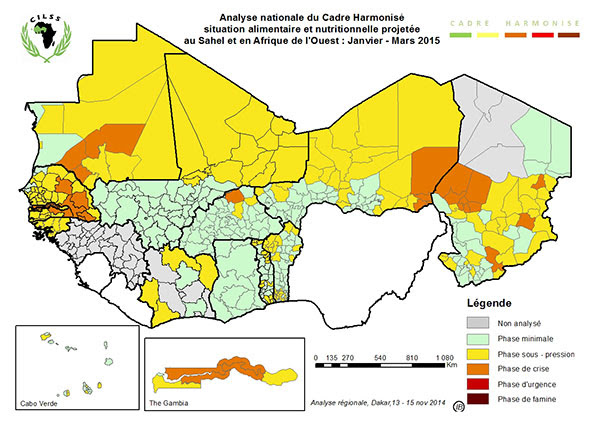
Summary of conclusions in English: http://www.oecd.org/20conclusion_EN.pdf
Summary of conclusions in French: http://www.oecd.org/RPCA%Lome_FR.pdf
ECOWAS states vow to eradicate statelessness
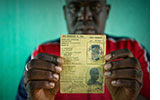 ECOWAS member states have pledged work to resolve the situation of hundreds of thousands of people living without legal status in the region. Ministers from 15 countries adopted a "Declaration on the prevention, reduction and elimination of statelessness in West Africa" during a high-level conference on 25 February in Abidjan. The Abidjan meeting was organised by the ECOWAS Commission and the UN High Commissioner for Refugees (UNHCR) and hosted by the Ivorian government. "Statelessness is a matter that bears not only on the humanity and dignity of thousands of our people but also on the peace and security of the region," ECOWAS Commission Vice President Toga Mcintosh said. The Declaration lists 25 commitments aimed at guaranteeing citizenship and belonging to all members of the West African community. It highlights the need for countries to gather information on the causes and the scale of the problem. The Declaration also states that all children should have a nationality established at birth and that men and women must have equal rights to acquire or change nationality and to pass on their nationality to their children. UNHCR head António Guterres said the declaration is in keeping with West Africa's reputation as a region of great hospitality. "The region's commitment to ending statelessness reflects the best of that tradition", he said. "It recognises that, ultimately, the concept of 'belonging' goes beyond legal texts and identity documents, and also requires political will to build tolerance and acceptance, and the social and human space for all members of society to be recognised, to contribute, and to belong." The UNHCR has launched a global campaign to eliminate statelessness by 2024. The agency estimates that there are 10 million people around the world who are stateless or at risk of statelessness. In West Africa, the number is 750 000, including 700 000 in Côte d'Ivoire alone. Stateless persons face a life in limbo and often have difficulty accessing education, healthcare and employment. In addition, the UNHCR says the inability to prove citizenship leaves people vulnerable to discrimination and abuse.
ECOWAS member states have pledged work to resolve the situation of hundreds of thousands of people living without legal status in the region. Ministers from 15 countries adopted a "Declaration on the prevention, reduction and elimination of statelessness in West Africa" during a high-level conference on 25 February in Abidjan. The Abidjan meeting was organised by the ECOWAS Commission and the UN High Commissioner for Refugees (UNHCR) and hosted by the Ivorian government. "Statelessness is a matter that bears not only on the humanity and dignity of thousands of our people but also on the peace and security of the region," ECOWAS Commission Vice President Toga Mcintosh said. The Declaration lists 25 commitments aimed at guaranteeing citizenship and belonging to all members of the West African community. It highlights the need for countries to gather information on the causes and the scale of the problem. The Declaration also states that all children should have a nationality established at birth and that men and women must have equal rights to acquire or change nationality and to pass on their nationality to their children. UNHCR head António Guterres said the declaration is in keeping with West Africa's reputation as a region of great hospitality. "The region's commitment to ending statelessness reflects the best of that tradition", he said. "It recognises that, ultimately, the concept of 'belonging' goes beyond legal texts and identity documents, and also requires political will to build tolerance and acceptance, and the social and human space for all members of society to be recognised, to contribute, and to belong." The UNHCR has launched a global campaign to eliminate statelessness by 2024. The agency estimates that there are 10 million people around the world who are stateless or at risk of statelessness. In West Africa, the number is 750 000, including 700 000 in Côte d'Ivoire alone. Stateless persons face a life in limbo and often have difficulty accessing education, healthcare and employment. In addition, the UNHCR says the inability to prove citizenship leaves people vulnerable to discrimination and abuse.
Press release in English: http://news.ecowas.int/ang=en&annee=2015
Press release in French: http://news.ecowas.int/043&lang=fr&annee=2015
Mali parties reach agreement on draft peace deal
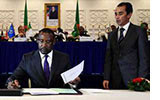 Malian Foreign Minister Abdoulaye Diop described a tentative deal with armed groups "a promise of peace" in northern Mali. The "Mali Peace and Reconciliation Agreement" preserves the central government's sovereignty over all Malian territory while devolving some powers to the local level. After eight months of tough negotiations, representatives of the government, the mediation team and some militant groups initialled the agreement on 1 March in Algiers. However, the Touareg alliance, which includes the National Movement for the Liberation of Azawad (MNLA), requested a "reasonable delay" in order to consult with constituents. A representative of the group said the delay is not meant to scuttle the deal but rather to strengthen it. "An agreement that has not been shared with the people of the region has little chance of being implemented on the ground," he said. Algerian Foreign Minister Ramtane Lamamra, who has been driving the negotiations, said he is optimistic the agreement will be signed by all parties in a matter of weeks. The accord calls for the establishment of powerful regional assemblies as well as "greater representation of the northern populations in national institutions". The government commits to establish a "mechanism to transfer 30% of budget revenues from the state to local authorities... with particular attention to the North".
Malian Foreign Minister Abdoulaye Diop described a tentative deal with armed groups "a promise of peace" in northern Mali. The "Mali Peace and Reconciliation Agreement" preserves the central government's sovereignty over all Malian territory while devolving some powers to the local level. After eight months of tough negotiations, representatives of the government, the mediation team and some militant groups initialled the agreement on 1 March in Algiers. However, the Touareg alliance, which includes the National Movement for the Liberation of Azawad (MNLA), requested a "reasonable delay" in order to consult with constituents. A representative of the group said the delay is not meant to scuttle the deal but rather to strengthen it. "An agreement that has not been shared with the people of the region has little chance of being implemented on the ground," he said. Algerian Foreign Minister Ramtane Lamamra, who has been driving the negotiations, said he is optimistic the agreement will be signed by all parties in a matter of weeks. The accord calls for the establishment of powerful regional assemblies as well as "greater representation of the northern populations in national institutions". The government commits to establish a "mechanism to transfer 30% of budget revenues from the state to local authorities... with particular attention to the North".
Article in English: http://news.yahoo.com/ebels-delay-112734257.html
Article in French: http://www.jeuneafrique.com/WEB20150302082425/
Nigerian president tours areas recaptured from Boko Haram
 Nigerian President Goodluck Jonathan paid surprise visits to areas recently recovered from Boko Haram militants. Jonathan arrived in Mubi, the second-largest city in Adamawa State, on 26 February accompanied by top military and security officials. The president later travelled to nearby Vintim village and to Baga, in neighbouring Borno State. Nigerian troops liberated the strategically important town of Baga on 21 February after weeks of occupation by the Islamist sect. Hundreds of people were killed and thousands displaced when Boko Haram fighters overran the town near the borders with Cameroon, Chad and Niger. During his visit to the northeast, Jonathan thanked troops for their bravery in recapturing lost territory and pledged the government's full commitment to the military effort. The army has stepped up its campaign against Boko Haram in recent weeks, recapturing several towns and localities from militant control. While military officials claim momentum, the militants have continued to carry out attacks in north-eastern cities. On the same day as the president's visit to the region, a series of bomb blasts killed 17 people in Jos, Plateau State, and a suicide bomber killed 10 people in Biu, Borno State. The continuing insecurity in the northeast has forced a delay in national elections and undermined President Jonathan's bid for re-election.
Nigerian President Goodluck Jonathan paid surprise visits to areas recently recovered from Boko Haram militants. Jonathan arrived in Mubi, the second-largest city in Adamawa State, on 26 February accompanied by top military and security officials. The president later travelled to nearby Vintim village and to Baga, in neighbouring Borno State. Nigerian troops liberated the strategically important town of Baga on 21 February after weeks of occupation by the Islamist sect. Hundreds of people were killed and thousands displaced when Boko Haram fighters overran the town near the borders with Cameroon, Chad and Niger. During his visit to the northeast, Jonathan thanked troops for their bravery in recapturing lost territory and pledged the government's full commitment to the military effort. The army has stepped up its campaign against Boko Haram in recent weeks, recapturing several towns and localities from militant control. While military officials claim momentum, the militants have continued to carry out attacks in north-eastern cities. On the same day as the president's visit to the region, a series of bomb blasts killed 17 people in Jos, Plateau State, and a suicide bomber killed 10 people in Biu, Borno State. The continuing insecurity in the northeast has forced a delay in national elections and undermined President Jonathan's bid for re-election.
Article in English: http://www.vanguardngr.com/towns-from-boko-haram/
Article in French: http://www.france24.com/fr/martyrs-attentats-jos-borno/
Who's Who? General Bouréma Condé, Guinean Minister of Territorial Administration and Decentralisation
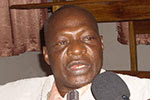 Guinea's new minister for territorial administration and decentralisation assured an anxious public that he has no interest in politics as he was sworn in as the country's top official in charge of elections. When President Alpha Condé named army General Bouréma Condé to his new position on 24 February, he cited Ebola as his main motivation. With the president eager to put an end to the outbreak, he said he needed a strong hand to command the government's response. "Our objective is two-fold: to strengthen the mobilisation of local authorities and to increase awareness of local communities (of Ebola)," a government spokesman said. But with the appointment coming just months ahead of a presidential election, the opposition immediately expressed concern. "The president had succeeded in getting rid of the soldiers, but to our amazement they are coming back and occupying strategic posts," opposition politician Faya Bourouno said. General Condé is known as one of president's closest allies in the military. In remarks at his inauguration ceremony, Condé sought to allay any fears. ''Those who see my coming to head of territorial administration as an action related to the elections are missing the mark," he said. "Look for me on the field for development, national unity, there you will not miss," the general declared. The minister, who will be charged with equipping and supporting the electoral commission during elections scheduled for later this year, said all Guineans are equal in his eyes and vowed not to show favouritism toward any political camp. "The Guinea of hatred, of intolerance, of contempt for the other, non-respect for authority, we attèlerons us to fight. On this ground, I will be intractable, '' insisted Condé. The general is of no relation to the president.
Guinea's new minister for territorial administration and decentralisation assured an anxious public that he has no interest in politics as he was sworn in as the country's top official in charge of elections. When President Alpha Condé named army General Bouréma Condé to his new position on 24 February, he cited Ebola as his main motivation. With the president eager to put an end to the outbreak, he said he needed a strong hand to command the government's response. "Our objective is two-fold: to strengthen the mobilisation of local authorities and to increase awareness of local communities (of Ebola)," a government spokesman said. But with the appointment coming just months ahead of a presidential election, the opposition immediately expressed concern. "The president had succeeded in getting rid of the soldiers, but to our amazement they are coming back and occupying strategic posts," opposition politician Faya Bourouno said. General Condé is known as one of president's closest allies in the military. In remarks at his inauguration ceremony, Condé sought to allay any fears. ''Those who see my coming to head of territorial administration as an action related to the elections are missing the mark," he said. "Look for me on the field for development, national unity, there you will not miss," the general declared. The minister, who will be charged with equipping and supporting the electoral commission during elections scheduled for later this year, said all Guineans are equal in his eyes and vowed not to show favouritism toward any political camp. "The Guinea of hatred, of intolerance, of contempt for the other, non-respect for authority, we attèlerons us to fight. On this ground, I will be intractable, '' insisted Condé. The general is of no relation to the president.
Article in English: http://www.reuters.com/article/N0LT01G20150225
Article in French: http://www.africaguinee.com/terrain-des-elections-se
Publication: Combined mid-term review and regional portfolio performance review of the regional integration strategy paper for West Africa 2011 - 2015
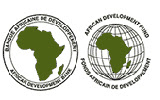 AfDB projects to support West African integration are on track, according to a new report based in part on consultations with regional stakeholders, including the ECOWAS and UEMOA Commissions. The mid-term review (MTR) aims to assess the continued relevance and effectiveness of the Regional Integration Strategy Paper (RISP) adopted in 2011 and to make recommendations to strengthen the Bank's approach. The report finds the implementation of the 43 operations in the Bank's regional portfolio has been satisfactory. To enhance the Bank's contribution to integration, the report recommends a greater focus on infrastructure development as well as "renewed attention at addressing fragility, gender and food security, including through a new programme on resilience in the Sahel." In particular, the MTR calls for increased Bank support to the Sahel and to Mano River Union countries.
AfDB projects to support West African integration are on track, according to a new report based in part on consultations with regional stakeholders, including the ECOWAS and UEMOA Commissions. The mid-term review (MTR) aims to assess the continued relevance and effectiveness of the Regional Integration Strategy Paper (RISP) adopted in 2011 and to make recommendations to strengthen the Bank's approach. The report finds the implementation of the 43 operations in the Bank's regional portfolio has been satisfactory. To enhance the Bank's contribution to integration, the report recommends a greater focus on infrastructure development as well as "renewed attention at addressing fragility, gender and food security, including through a new programme on resilience in the Sahel." In particular, the MTR calls for increased Bank support to the Sahel and to Mano River Union countries.
Report in English: http://www.afdb.org/regional_portfolio_2015.pdf
Report in French: http://www.afdb.org/portefeuille_régional_2015.pdf
